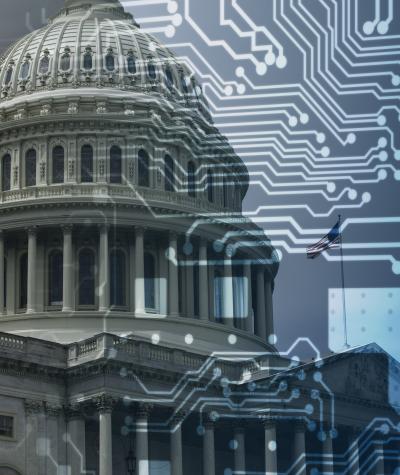As the 2024 election rapidly approaches, the risk that artificial intelligence (AI) could be used to deceive voters or manipulate our democratic process continues to grow. Thankfully, there are promising signs in Congress for a bipartisan path to safeguard elections from the emerging threat this technology presents.
AI is a game-changer due to its unprecedented ability to create realistic false content. Although disinformation — meaning the use of false or misleading information to distort or disrupt the political process — is an old idea, it has grown more threatening with the development of new AI-powered tools, which can quickly and cheaply produce fake audio, images, videos or other media that are more convincing than ever before.
In the context of elections, AI could be used to distort reality and mislead voters in dangerous ways.
Consider just a few examples: AI-generated political ads that deceive the public about what candidates are saying or doing, depictions of events that never actually happened, simulations of trusted voices discouraging voters from casting a ballot, fictional evidence of misconduct by poll workers, or even false admissions of election interference.
If left unchecked, these (and other) abuses of AI could violate voters’ fundamental right to make informed decisions while severely undermining trust in our elections.
Last year, Campaign Legal Center’s (CLC) president, Trevor Potter, testified before the U.S. Senate about AI and urged Congress to “approach these challenges without regard for partisanship or political gain,” emphasizing that legislators on both sides of the aisle ought to be concerned and address the issue.
CLC has now endorsed two important bipartisan bills advanced by lawmakers who have taken those words to heart.
First is the AI Transparency in Elections Act, bipartisan legislation introduced by Senators Amy Klobuchar (D-MN) and Lisa Murkowski (R-AK). This bill would require a disclaimer on public communications — including TV spots, telephone calls, digital ads, and more — that are “substantially generated” by AI. This would cover campaign ads created or materially altered by AI, but helpfully not cover minor changes like using AI for image cropping or color correction.
In other words, voters would have to be notified when AI is used in a way that creates or meaningfully changes the media they view, which helps preserve voters’ right to make an informed decision at the ballot box.
To ensure these new transparency rules are followed, the legislation would also make it easier for the Federal Election Commission (FEC) to enforce the law and allow the agency to impose meaningful fines when the use of AI is not disclosed.
The second bipartisan proposal is the Protect Elections from Deceptive AI Act, a bill introduced by Senators Klobuchar (D-MN), Josh Hawley (R-MO), Chris Coons (D-DE), and Susan Collins (R-ME). This legislation would ban the intentional publishing of “materially deceptive” AI-generated political ads that are meant to influence an election or raise money.
Importantly, this bill is narrow and would only target the most dangerous AI-generated content: deliberately deceptive and fraudulent political ads intended to manipulate voters and undermine the integrity of elections.
Under the bill, candidates targeted by deceptive AI content could quickly seek a court order to have the misleading media taken down, as well as receive financial damages that would deter bad actors from misusing AI again.
By providing transparency for all material use of AI in elections, while banning the most harmful and deceptive abuses of this technology, these bipartisan bills provide a robust set of policy solutions.
If enacted, they would ensure that voters can engage in the democratic process without fear of being manipulated by AI, equipped with the necessary information to exercise their freedom to vote.
Additionally, these bills have been introduced by lawmakers from both sides of the aisle, providing a rare chance to strengthen our democracy on a bipartisan basis. This opportunity, combined with the urgency of addressing AI before upcoming elections, demands quick action.
For these reasons, Campaign Legal Center calls on Congress to pass the AI Transparency in Elections Act and the Protect Elections from Deceptive AI Act without delay.

